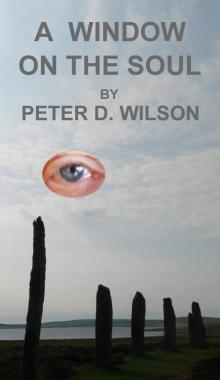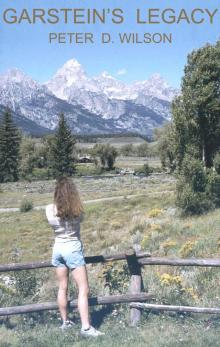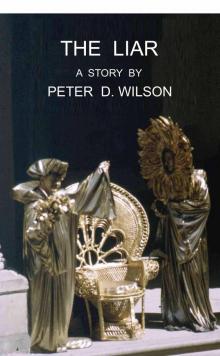- Home
- Peter D Wilson
On Wings of Song Page 4
On Wings of Song Read online
Page 4
looking for something that might serve. And we haven’t found it.”
I wondered where all this was leading.
“I’m coming to that, please let me do it in my own way. Now, I was quite impressed by what I saw of your ‘Dido’ the other night, but it’s a bit amateurish - no offence, I hope.”
“None taken. That’s an understatement.”
“Right. Cynthia’s bunch is much more polished, but unadventurous. Put them together, and we might really have something. Something that Watsons could be proud to sponsor.”
That really was food for thought, but we needed specifics. “Just what would that involve?”
“It would have to be worked out by agreement, of course. On your part, a certain number of appearances per year - not more than half a dozen, I should think, maybe less. On ours, the obvious things are to provide matching costumes - some professional coaching perhaps - subsidised travel ...”
“Travel?”
“Oh, yes, you’d have to go about a bit. Get yourselves noticed more widely. Otherwise there’d be no point.”
“Don’t forget we have other responsibilities - jobs to do, families to look after ...”
“Yes, yes, of course all that would have to be taken into consideration. But there’s no sense in getting ahead of ourselves; what do you think of the general idea?”
“Hmm. Well, I can certainly see it appealing to Barbara; I’m not sure of the others. Probably mixed feelings. How does Cynthia react?”
“I haven’t mentioned it to her - wanted your reaction first. Can I take it that you don’t completely rule out the idea?”
“Yes, I suppose that’s fair enough, but my influence really doesn’t amount to much; hardly anything, in fact, so for goodness sake don’t exaggerate it. This is just a possibility that we’ll have to consider.”
“That’s fine.” He finished his glass and asked if I fancied another, but I was driving and declined. He produced his card, scribbled a private number on the back, and asked me to get in touch when I had something to report. “Discreetly, of course,” he emphasised.
All this obviously had to be discussed straight away with Barbara herself; in confidence; there’d be ructions if she found out that anything of this sort had been going on behind her back. As expected, her first thought was of who would be in charge of combined operations, and it seemed unwise to mention Gordon’s proposed solution, at least at this stage. Instead I suggested that she and Cynthia could alternate, which might work as a provisional arrangement until we saw how things went. That was where we left it. Meanwhile we had our own production to get up to scratch, and we concentrated on that for the next few weeks.
The St. Cyprian’s people turned up as arranged and were grateful to find that I’d negotiated on their behalf a serial booking at a slight discount on the normal rate for casuals. As a further touch I suggested that our two tea-ladies might do the honours for them; at one time or another they had both commented on having rather limited social opportunities, so as expected they agreed readily and seemed to enjoy mixing with a new crowd. One week when the schedule had to be rearranged, by some oversight a few of St. Cyprian’s were not notified, arrived on our evening and stayed as guests, making themselves quite agreeable. All in all, the prospects for joint activities were beginning to look rather promising.
In the event, “Dido” went off pretty well despite an outbreak of first-night nerves that put a few fluffs, and perhaps a bit of extra zing, into that performance. We had good support from St. Cyprian’s, greatly appreciated. I’d sent a complimentary ticket to Cynthia, not expecting her to use it but it seemed a worthwhile gesture; she could always give it away. In fact she turned up in person, although very slyly at the last minute and slipping into a back seat with a signal to keep mum about it. She even sent a note of thanks afterwards with more generous comments than I thought really deserved, again just for my own attention.
It was therefore no great surprise when a ticket to her concert came for Barbara. I’m afraid she was rather nasty about it in private, but I persuaded her to be at least civil and she deputed the long-suffering Fred to represent her. It wasn’t his line at all, but he endured it with at least a pretence of interest; enthusiasm was too much to expect. I went under my own steam and was pleased to see Joan and Gordon arrive together.
After all this, the idea of joining forces on occasion seemed much less far-fetched than I had first thought possible, and discussions started in earnest. When proposed by Gordon I reluctantly accepted, purely for procedural purposes, the post as chairman of the managing committee. Watsons asked for ideas on the kind of uniform to be used for appearances under their sponsorship, causing a flurry of interest among the ladies and impatience in the men. Because of other commitments, the line-up was likely to vary substantially from time to time, so it would be wasteful to have fitted costumes for all, and we settled on a simple tabard to be worn over the ladies’ own white blouse and dark skirt, or the equivalent for men.
The choice of blazon for the tabard posed some difficulty; “Watson Tonight?”, suggested I believe by Harry Roberts who had reported the boot-throwing cats, was quickly dismissed as frivolous, but more constructive thoughts were sparse. Eventually we plumped for a simple “WATSONIA” as both design and name for the combined group. Especially for Harry’s benefit I emphasised that the stress should be on the second syllable, not to make it sound like “What’s on ’ere?”
Eventually we got round to more substantial matters, such as ideas for an inaugural concert. To save arguments it was agreed that it should be in two parts, respectively conducted, and the content chosen, by Barbara and Cynthia. The crucial question, of course, was who should come first. There was a certain amount of indecisive manoeuvring around it until someone suggested alphabetical order, but that would depend on whether based on Christian or surname. After about ten minutes of this nonsense Fred lost patience and told them for goodness sake to stop messing about and toss a coin for it, and so it was done.
Afterwards I couldn’t resist commenting quietly that this was the third time I’d noticed him getting involved in Barbara’s arguments, to increasing effect it seemed. He rather sheepishly said that he’d read somewhere (best not to ask where, I thought) that women really liked to be dominated, and while he couldn’t hope to do that it was worth trying to be less of a doormat. “And does she like it?” I wondered.
“Well, she hasn’t complained yet.”
Return to Contents
Bill Watson himself naturally wanted to see what his sponsorship was achieving, and Barbara belatedly realised that it might be a good idea to inquire about his tastes. According to Gordon, he was practically tone deaf and wouldn’t know “Billy Budd” from Buddy Holly, but his wife was fairly knowledgeable and it would be diplomatic to involve her. Accordingly a programme committee was set up (groans all round), naturally including Barbara and Cynthia, and Elizabeth was invited to join it. Barbara was a bit prickly at first, but in time grudgingly admitted that her contributions were quite helpful.
The next question was where to hold the concert. Obviously it had to be on neutral territory, but of the immediately local possibilities, the town hall was far too large and expensive, while the others were inconveniently small. I started to look into the likelihood of being able to get a reduced rate for a special occasion from whoever might be responsible for managing town properties, but felt I was being passed around like a Chinese parcel and was thoroughly fed up with it when the answer came out of the blue.
A Russian businessman, finding things a shade too hot for him back home, had bought a dilapidated Georgian house a few miles away and spent what to us would be a substantial fortune, but to him was probably peanuts or whatever the Russian equivalent may be, on restoring it to its original glory augmented by a full complement of mod cons. He was anxious to ingratiate himself with the local community, or at least its more prominent members, and had cultivated acquaintance with all those he thought particul
arly influential, including Bill and Elizabeth Watson. To help matters along he had thought it advisable to change his rather jaw-wrenching name by deed poll to Stephen Norris, which bore some faint resemblance to the original.
His particular pride among the renovations was in the music room, and he had thought of having a house-warming party on midsummer’s eve for his new-found cronies in the form of a concert. The idea at first was to get some well-known ensemble such as the King’s Singers or the Northern Sinfonia, but of course they were all booked up for years ahead and he had to lower his sights. On some convivial occasion he was bemoaning the difficulty to Bill, who promptly offered the services of Watsonia, without mentioning that it hadn’t yet actually performed publicly. Norris, naturally, jumped at it.
This news was received with mixed feelings. At least we had a venue, and practically everyone was eager to see what had been done with the Manor. On the other hand, it was a very different kind of occasion from what had been contemplated, so that families could hardly expect to be invited. Moreover, it meant a late night further away from home than some of the members relished. Then Mavis Bannister pointed out that Norris’s past business practices were strongly rumoured to have left

 A Window on the Soul
A Window on the Soul_preview.jpg) Towards Sunset (third edition)
Towards Sunset (third edition) Exit, pursued by a bear
Exit, pursued by a bear Pebbles from a Northern Shore
Pebbles from a Northern Shore Stage 12
Stage 12 Garstein's Legacy
Garstein's Legacy The Liar
The Liar On Wings of Song
On Wings of Song The Jester's Daughter
The Jester's Daughter Skiddlethorpe and other stories
Skiddlethorpe and other stories